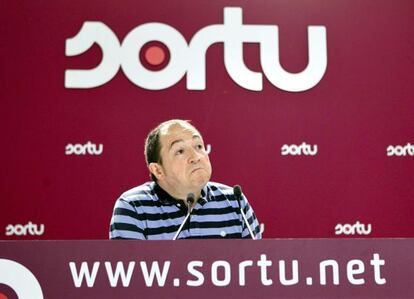Radical nationalist Basque party calls on ETA to hand over its arms
Sortu confident that terrorist prisoners will seek social rehabilitation


Sortu, the radical Basque nationalist party that many consider to be the heir to Batasuna, ETA's outlawed political wing, is convinced that the terrorist group will eventually lay down its weapons and that ETA convicts will make individual requests for social rehabilitation, rather than seek a blanket amnesty as demanded by the most radical sectors of nationalism.
Party sources also said Sunday that this new strategy will become visible between September and October.
After ETA announced an end to its terrorist activities on October 20, 2011 — although it failed to turn in its weapons — its leaders aimed to sit down with the central government to negotiate the terms of this final step in exchange for favorable measures for ETA prisoners. The model to follow was the Northern Ireland peace process.
But in the 19 months that have elapsed since then, which included national elections in November 2011 that ousted the Socialists from power and brought in the conservative Popular Party (PP), it became crystal clear that such negotiations were not going to happen. Instead, the administration of Prime Minister Mariano Rajoy pressured Norway to deport ETA leaders who had settled down in that country, and made renewed efforts to arrest Josu Ternera, a historical ETA leader.
The Basque Nationalist Party (PNV), in power in the northern region, and other political forces in the Basque assembly have also insisted that ETA definitively turn over its weapons and that its prisoners accept that they can only make individual requests for social rehabilitation.
ETA inmates should seek individual rehabilitation rather than a blanket amnesty
Nevertheless, these parties continue to criticize Rajoy's refusal to budge on longstanding ETA demands such as transferring prisoners to penitentiaries in the Basque region, rather than making them serve their sentences elsewhere in the country.
It is in this context that Sortu, created in February 2011, is trying to convince ETA to forget about the Irish model and lay down its weapons with no further concessions by the Spanish government. Sources familiar with the situation underscored the "difficulty and complexity" of turning in weapons, caches, apartments and other assets while the central government remains "oblivious."
One of the possibilities being contemplated by Basque radicals is for the International Verification Committee that is overseeing ETA's definitive end, and which is coordinated by conflict resolution expert Ram Manikkalingam, to act as a witness to this process of turning in its stash; the committee could also certify the end of extortion through threatening letters, a habitual form of funding for ETA, as well as the end of kale borroka, the street violence that used to result in burnt buses and other acts of vandalism.
Sortu is also trying to convince ETA convicts to use legal channels for accessing penitentiary benefits, rather than demanding a blanket amnesty that will not be granted. Sources in radical nationalism said that "the ETA prisoner community will embrace individual rehabilitation requests as long as they are preceded by a collective agreement that this should be so." The debate is still open, with a hardcore minority refusing to accept either disarmament or individual rehabilitation.
Sortu says it feels confident that its views have gained traction
The debate is not new. In June 2012 the ETA prisoner community ignored a similar proposal by Sortu to avoid creating an internal rift. But a year later, Sortu feels optimistic about the future, and feels confident that its views have gained traction within the community.
But the Basque government and other mainstream parties are being "prudent," recalling earlier failures on this front. The Iñigo Urkullu administration said that if ETA puts forward a "schedule and a serious disarmament and prisoner rehabilitation request program," it will make its own commitments.
If this were the case, it would pave the way for the peace plan presented by Basque premier Urkullu in the regional assembly a month and a half ago. "The main obstacle to progress toward peaceful coexistence in the Basque Country is the permanence of ETA," said the same sources. "If it disarms, the main problem will disappear."
Tu suscripción se está usando en otro dispositivo
¿Quieres añadir otro usuario a tu suscripción?
Si continúas leyendo en este dispositivo, no se podrá leer en el otro.
FlechaTu suscripción se está usando en otro dispositivo y solo puedes acceder a EL PAÍS desde un dispositivo a la vez.
Si quieres compartir tu cuenta, cambia tu suscripción a la modalidad Premium, así podrás añadir otro usuario. Cada uno accederá con su propia cuenta de email, lo que os permitirá personalizar vuestra experiencia en EL PAÍS.
¿Tienes una suscripción de empresa? Accede aquí para contratar más cuentas.
En el caso de no saber quién está usando tu cuenta, te recomendamos cambiar tu contraseña aquí.
Si decides continuar compartiendo tu cuenta, este mensaje se mostrará en tu dispositivo y en el de la otra persona que está usando tu cuenta de forma indefinida, afectando a tu experiencia de lectura. Puedes consultar aquí los términos y condiciones de la suscripción digital.








































